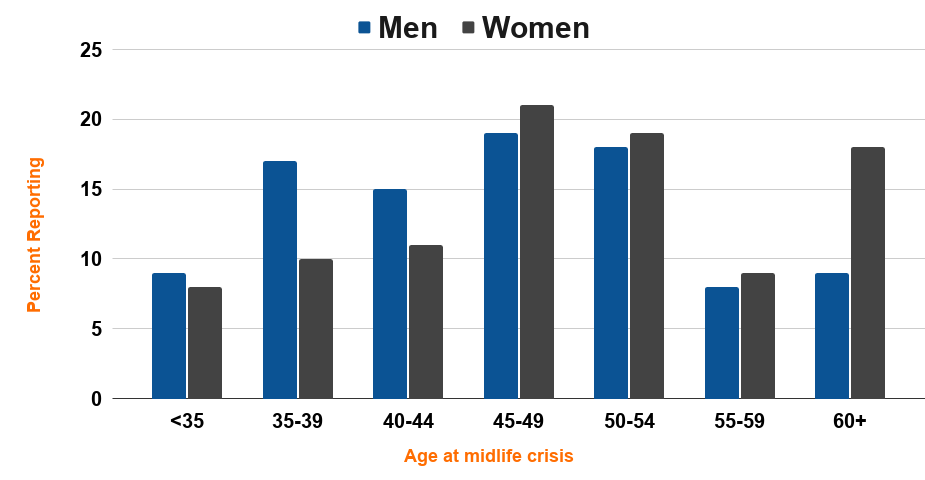Signs of a Midlife Crisis Coming to an End
WhatToGetMy Instructional Article
- A midlife crisis is what happens to men and women when they reach their 40s and start contemplating their life choices, their mortality, and their purpose on earth.
- The realization that life is short and that they haven’t accomplished much in life often drives some people into a temporary panic that resembles an existential crisis.
- This panic is what is known as a midlife crisis. Continue reading this article to learn what it is, how long it lasts, and how to effectively treat it.
Watch the video version of this article:
WHAT IS A MIDLIFE CRISIS?
A midlife crisis is generally characterized between the ages of 45 to 65 when humans start assessing their mortality in relation to their achievements. Most people will start “acting out of character” and doubting their sense of identity and confidence. A midlife crisis causes anxiety, depression, and remorse. Although they harbor some similar symptoms, a midlife crisis is, however, different from an existential crisis due to the fact that an existential crisis can occur to anyone at any age while a midlife crisis only affects people in their mid-40s and above. As shown in the graph below, men tend to experience midlife crisis the most in their mid/late 30s as opposed to women who
experience a midlife crisis at an older age – usually from their mid/late 40s.
Distribution of self-reported midlife crises, by gender and age at crisis. Source: www.researchgate.net

WHAT CAUSES A MIDLIFE CRISIS?
A midlife crisis can be set on by a number of things either missing or existing in a person’s life. The major driving force being regret – some people might regret the person they married, the career they chose, and even having had children (or lack thereof). Men and women have different reasons/triggers for their midlife crises; for men, their midlife crisis is often set on by work issues and financial responsibilities. Women, on the other hand, are triggered by their evaluation of personal (spiritual or otherwise) accomplishments.
WHAT ARE THE SIGNS OF A MIDLIFE CRISIS?
To start off, we have to disclaim that a midlife crisis is not a diagnosable illness and therefore the signs are only what has been observed by people who have self-diagnosed. These signs are more of commonalities and observations among people who have experienced a midlife crisis – because even though it is common, not every middle-aged person goes through a midlife crisis. Having stated that below are some of the signs of a midlife crisis:
1. Dramatic Change in Behavior
One of the major signs of a midlife crisis is a drastic change in behavior over a short period of time. This comes off as an attempt to cling to one’s youth and it is characterized by dressing “younger”, making friends with people significantly younger, hanging out in places that are not “age-appropriate”, and adopting youth lingo. If you see your partner going through this, chances are they are going through a midlife crisis.
2. Excessive Spending in Men
With wanting to cling to youth comes the excessive spending, especially in men. They will splurge their money – and even their savings – on material things that hold no meaning to them but remind them of a time they were younger, with the most sought after item being a sports car. This can be attributed to the fact that most men take on financial responsibility after they get married and this leaves them with very little money for personal use outside of the family. To make up for this, men will spend money on all the things they wished they’d have had when they were in their younger years.
3. Withdrawal from Family in Women
Midlife crisis in women tends to come in the form of withdrawal from familial duties. Similar to men, most women give up their youth to start and raise a family. This means that they have less time to focus on themselves and they oftentimes lose their sense of identity. When a midlife crisis hits, most women tend to step away from their familial roles and try to find themselves – for most women, midlife crisis hits when their children have grown and moved out of the house and no longer need care, and also when women start experiencing menopause.
MIDLIFE CRISIS DEPRESSION & THE WALK AWAY SPOUSE
Midlife crisis amongst married people often leads to either the husband/wife experiencing midlife crisis moving out. This is because at the moment, their goals and aspirations in life are not aligning and their changed behavior may be too much to handle for their spouse who is not going through a midlife crisis.
It is important to remember that the acting out that seemingly follows a midlife crisis is often a side effect of depression. The person is depressed and triggered by the fact that they are going to die soon and haven’t accomplished much outside of their duties to their family.
If you are in a mental state that can allow you to take care of your spouse as they go through a midlife crisis, then, by all means, help and guide them through it, help them seek help from a professional therapist and work through their depression (which is a product of pent up anger and sadness). However, if you are not in the right mental state to support another human being and carry their emotional baggage – you are well within your rights to leave the relationship especially if it proves to be toxic for you.
WHAT ARE THE SIGNS OF A MIDLIFE CRISIS COMING TO AN END?
Depending on the person, or what triggered the midlife crisis, and whether or not the person is actively working on getting better, the end of a midlife crisis can be short-term or long-term. So what are the signs that a midlife crisis is ending? Below are a few telltale signs that he/she is coming out of a midlife crisis:
1. COMMUNICATION
They start communicating their feelings to you and acknowledging their change in behavior. The first step to getting better is admitting you have a problem and when they reach out to you and admit that they haven’t been themselves, this is a sign that they have noticed a pattern in their behavior that has been harmful either to them or the people around them. When they come to you, this is a clear sign that their midlife crisis is heading towards the end.
2. ACCEPTANCE
The second step you will notice when a person is trying to end a midlife crisis is when they have not only communicated with you about their fears and depression, but they have now also accepted that they are experiencing an emotional turmoil and they haven’t handled it in the best way possible. It is this acceptance that is going to make it easier for them to transition to the final stages of a midlife crisis.
3. THERAPY
So, how does a midlife crisis end? A midlife crisis ends when the person going through it accepts that he/she needs to work on his mental health for his/her own sake or for the sake of the people around them who they care deeply for. Seeking therapy will help them tackle the issues that led them into depression and the subsequent midlife crisis that followed. When someone has confided in you, accepted that they have a problem, and enroll in therapy, that’s how you know that their midlife crisis is coming to an end. Depending on the underlying issue, therapy can take years but it helps them live with themselves and make peace with the choices that they made over the course of their life.
FREQUENTLY ASKED QUESTIONS
What happens at the end of a midlife crisis?
At the end of a midlife crisis, a person usually comes to terms and learns to accept their life choices and how to live with the consequences without resentment or fear of mortality. Therapy helps in shifting perspective, therefore allowing the person to view their choices and experiences in a lighter, more positive way. At the end of a midlife crisis, the person comes out understanding themselves better and be comfortable with the concepts of aging and dying.
Do husbands/wives return after a midlife crisis?
Reconciliation after a midlife crisis is possible, however, this depends on how things were left during the crisis and if it can be repaired. This will also depend on whether or not the person who was left wants to take them back after the crisis is over. However, it is important to also note that some people have gone and found the love of their lives after leaving their spouse during a midlife crisis and never looked back. The moral of the story is; do not sit around waiting for someone to come back for you if they left you because you do not know how long it is going to take them – if ever – to come back to you. Focus on yourself, instead. Use this time to figure out who you are and what you would like to be outside of their existence. If they decide to come back and you still want them, good – and if they don’t, you will not go around regretting only just sitting around and waiting for them to come back to you. Live your life, as they have chosen to live theirs.
How do you deal with your spouse’s midlife crisis?
The best way to deal with a spouse’s midlife crisis is to remember that underneath it all, your spouse is really depressed about their life choices, which might involve you, and although that may be hurtful you should approach them and the situation with love and compassion. You must also be respectful of their choices and decisions at this point because although their actions may seem random and out of character for you, they are really just expressing their innermost buried desires. So when they choose to leave you, allow them to go because clinging onto them will only make them resent you, and make their crisis worse and last longer. You should always suggest therapy and see if they will take you up on it – if they do, you can either go with them to therapy or let them see a therapist on their own – whatever they are most comfortable with. Dealing with a partner that is going through a midlife crisis can be a lot to handle but always remember to respect their autonomy.
CONCLUSION
If you or someone close to you is going through a midlife crisis, you may find yourself wondering “when does midlife crisis end?” In reality, there is no discernible timeline on when the crisis will end. However, the crisis will last as long as the person does not accept that they are going through a crisis and seeks help. It is only when this happens that they can begin to seek help and begin healing whatever emotional turmoil triggered the crisis in the first place.
01 HOUR 11 MINUTES
ESTIMATED TIME DESIGNING AND UPLOADING THIS ARTICLE
10 HOURS 20 MINUTES
ESTIMATED TIME RESEARCHING AND WRITING THIS ARTICLE
You Might Also Like


